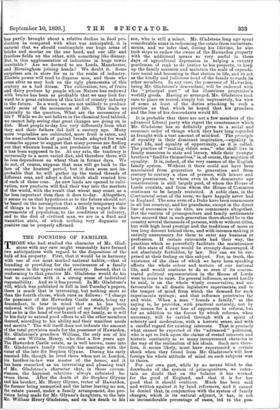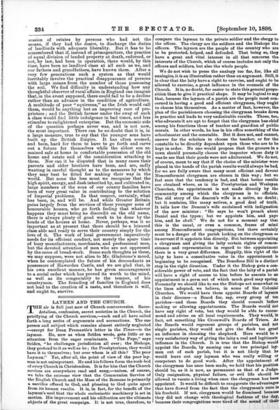THE FOUNDING- OF FAMILIES.
THOSE who had studied the character of Mr. Glad- stone with any care might reasonably have formed two anticipations with regard to the disposition of the bulk of his property. First, that it would be in harmony with one of our most marked national habits,—that of founding or providing for the continuance of a family succession in the upper ranks of society. Second, that in conforming to that practice Mr. Gladstone would do his best to associate with it a strong sense of individual responsibility. And so it has proved. In Mr. Gladstone's will, which was published in full in last Tuesday's papers, there is much that is interesting, but nothing more so than the fourth clause, which runs as follows : "I charge the possessor of the Hawarden Castle estate, being my descendant, to bear in mind that as he has been endowed with the principal part of my worldly goods, and as he is the head of our branch of my family, so it will be his duty to extend good offices to all the other members thereof, according to his ability and their manifest needs and merits." The will itself does not indicate the amount of the total provision made for the possessor of Hawarden, hr. Gladstone's grandson William, the only son of his eldest son William Henry, who died a few years ago. The Hawarden Castle estate, as is well known, came into hr. Gladstone's family through his marriage with the sister of the late Sir Stephen Glynne. During his early married life, though he lived there when not in London, his brother-in-law was master of the house, and it has been remarked as an interesting and pleasing trait of Mr. Gladstone's character that, in those circum- stances, the happiest relations always subsisted be- tween them. After the death of Sir Stephen Glynne and his brother, Mr. Henry Glynne, rector of Hawarden, the former being unmarried and the latter leaving no son, the estate passed, under a family arrangement, due pro- vision being made for Mr. Glynne's daughters, to the late ifr. William Henry Gladstone, and on his death to his son, who is still a minor. Mr. Gladstone long ago spent considerable sums in redeeming the estate from embarrass- ments, and we infer that, during his lifetime, he also took steps to endow the owner of the Hawarden property with the additional means so very useful in these days of agricultural depression in helping a country gentleman of rank to do justice to his property, to keep up the family mansion and maintain the scale of expendi- ture usual and becoming in that station in life, and to act as the kindly and judicious head of the family towards its other members. In any case, the possessor of Hawarden, being Mr. Gladstone's descendant, will be endowed with the "principal part" of his illustrious progenitor's worldly goods. Having so arranged, Mr. Gladstone took care to place on record, simply but impressively, his view of some at least of the duties attaching to such a position as that which he hoped that his grandson and the line of his descendants would fill.
It is probable that there are not a few members of the advanced Liberal party who regret the countenance which Mr. Gladstone has so definitely given to a social and economic order of things which they have long regarded as fraught with a vast amount of mischief. The principle of equality is their dominant inspiration,—equality in- social life, and equality of opportunity, as it is called. The practice of "making eldest sons," who shall live in- family mansions in state and luxury, while their younger brothers "fendfor themselves," is, of course, the negation of equality. It is, indeed, of the very essence of the English family system. Without it there could not have been. maintained from generation to generation and from century to century a class of persons, with leisure and large possessions, to whom even in this democratic age consideration is still largely paid, of whom the House of• Lords consists, and from whom the House of Commons continues to be largely recruited. A noble class, in the Continental sense of the term, we have happily never had in England. The sons even of a Duke have been commoners in all but courtesy, and his grandsons, except in the direct line of succession to the title, are commoners altogether.
But the custom of primogeniture and family settlemente have secured that in each generation there should be in the country several thousands of persons, with or without titles, but with high local prestige and the traditions of more or less long descent behind them, and with incomes making it entirely unnecessary for them to enter any business or profession. If certain extremists had their way, the• practices which so powerfully facilitate the maintenance of this state of things would be strongly discouraged, if not absolutely forbidden, by law. Nor can we be sur- prised at their feeling on this subject. For, in truth, the- existence of the class of which we have been speaking- affects the whole colour and texture of our national life, and would continue to do so even if its concen- trated political representation in the House of Lords were to cease to exist. Its general influence, as need hardly be said, is on the whole wisely conservative, and un- favourable to all drastic legislative experiments, and to the temper of mind from which the demand for such experiments springs ; and that influence penetrates far and wide. When a man "founds a family," as the saying is, he provides, with practical certainty, not by any means for a new line of opponents to reform, but for an addition to the forces by which reforms, when necessary, will be carried through with a spirit of sobriety and moderation, with a historic sense, and with a careful regard for existing interests. That is precisely what cannot be expected of the " advanced " politician, who is apt to look upon the claims of vested interests and historic continuity as so many inconvenient obstacles in the way of the realisation of his ideals. Such men there- fore, it seems likely, must have experienced a certain shock when they found from Mr. Gladstone's will how foreign his whole attitude of mind on such subjects was to theirs.
For our own part, while by no means blind to the drawbacks of the system of primogeniture, we enter- tain no doubt that on the balance it has worked for the good of England, and that it is for her good that it should continue. Much has been said and written against it by land reformers, and it cannot be denied that, in conjunction with the system of family charges, which is its natural adjunct, it has, in not an inconsiderable percentage of cases, led to the pos. session of estates by persons who had not the means, if they had the desire, to discharge the duties of landlords with adequate liberality. But it has to be remembered that if, instead of primogeniture, the practice of equal division of landed property at death, enforced, or not, by law, had been in operation, there would, by this time, have been no landlord class at all such as we, and our fathers and grandfathers, have known them. After a very few generations such a system as that would inevitably involve the practical disappearance of persons with large means from the number of those possessing the soil. We find difficulty in understanding how any thoughtful observer of rural affairs in England can imagine that, in the event supposed, there could fail to be a decline rather than an advance in the condition of agriculture. A multitude of poor " squireens," as the Irish would call them, would be anything but an improving race of pro- prietors ; and the British farmer under the sway of such a class would find little indulgence in bad times, and less stimulus to enlightened enterprise. But the economic side of the question perhaps never was, and is not now, the most important. There can be no doubt that it is, in a large measure, true to say that the younger sons have built up the British Empire. It has often seemed, and been, hard for them to have to go forth and carve out a future for themselves while the eldest son re- mained safe at home in comfortable possession of the old home and estate and of the consideration attaching to them. Nor can it be disputed that in many cases their parents and elder brothers have been, and are, sadly wanting in careful thought as to the measures by which they may best be fitted for making their way in the world. But none the less must we recognise that the high spirit, energy, and dash inherited by, and cultivated in, large numbers of the sons of our county families have been of very great value in contributing to the solution of Imperial problems. In that respect, certainly, what has been, is, and will be. And while Greater Britain gains largely from the services of those younger sons of honourable houses, who go forth feeling that whatever happens they must bring no discredit on the old name, there is always plenty of good work to be done by the heads of the houses at home. Never, perhaps, was it so important as at present that there should be a leisured class able and ready to serve their country simply for the love of it. The work of local government imperatively needs for its efficient conduct, not merely the spare time of busy manufacturers, merchants, and professional men, but the devoted attention of men who are not oppressed by the cares of bread-work. Some such thoughts as these, we may suppose, were not alien to Mr. Gladstone's mood, when he contemplated the future of his descendants as possessors of Hawarden Castle, and we are glad that, in his own excellent manner, he has given encouragement to a social order which has proved its worth to the mind, as well as its congeniality to the temper, of his countrymen. The founding of families in England does not lead to the creation of a caste, and therefore it will, and ought to, survive.



































 Previous page
Previous page